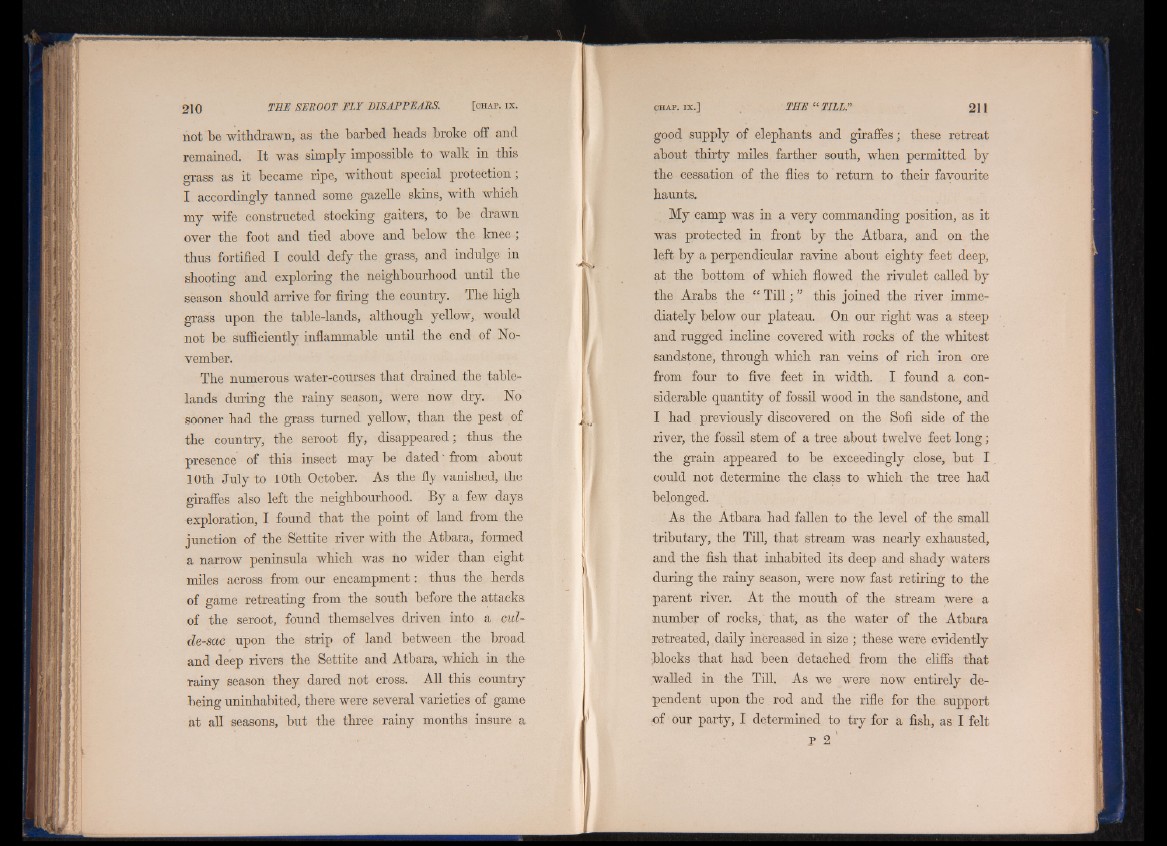
not be withdrawn, as the barbed beads broke off and
remained. It was simply impossible to walk in this
grass as it became ripe, without special protection;
I accordingly tanned some gazelle skins, with which
my wife constructed stocking gaiters, to be drawn
over the foot and tied above and below the knee ;
thus fortified I could defy the grass, and indulge in
shooting and exploring the neighbourhood until the
season should arrive for firing the country. The high
grass upon the table-lands, although yellow, would
not be sufficiently inflammable until the end of November.
The numerous water-courses that drained the tablelands
during the rainy season, were now dry. No
sooner had the grass turned yellow, than the pest of
the country, the seroot fly, disappeared; thus the
presence of this insect may be dated' from aDOut
10th July to 10th October. As the fly vanished, the
giraffes also left the neighbourhood. By a few days
exploration, I found that the point of land from the
junction of the Settite river with the Atbara, formed
a narrow peninsula which was no wider than eight
miles across from our encampment: thus the herds
of game retreating from the south before the attacks
of the seroot, found themselves driven into a cul-
de-sac upon the strip of land between the broad
and deep rivers the Settite and Atbara, which in the
rainy season they dared not cross. All this country
being uninhabited, there were several varieties of game
at all seasons, but the three rainy months insure a.
good supply of elephants and giraffes; these retreat
about thirty miles farther south, when permitted by
the cessation of the flies to return to their favourite
haunts.
My camp was in a very commanding position, as it
was protected in front by the Atbara, and on the
left by a perpendicular ravine about eighty feet deep,
at the bottom of which flowed the rivulet called by
the Arabs the “ Till; ” this joined the river immediately
below our plateau. On our right was a steep
and rugged incline covered with rocks of the whitest
sandstone, through which ran veins of rich iron ore
from four to five feet in width. I found a considerable
quantity of fossil wood in the sandstone, and
I had previously discovered on the Sofi side of the
river, the fossil stem of a tree about twelve feet long;
the grain appeared to be exceedingly close, but I
could not determine the class to which the tree had
belonged.
As the Atbara had fallen to the level of the small
tributary, the Till, that stream was nearly exhausted,
and the fish that inhabited its deep and shady waters
during the rainy season, were now fast retiring to the
parent river. At the mouth of the stream were a
number of rocks, that, as the water of the Atbara
retreated, daily increased in size ; these were evidently
blocks that had been detached from the c li f f s that
walled in the Till. As we were now entirely dependent
upon the rod and the rifle for the support
of our party, I determined to try for a fish, as I felt
P 2 '